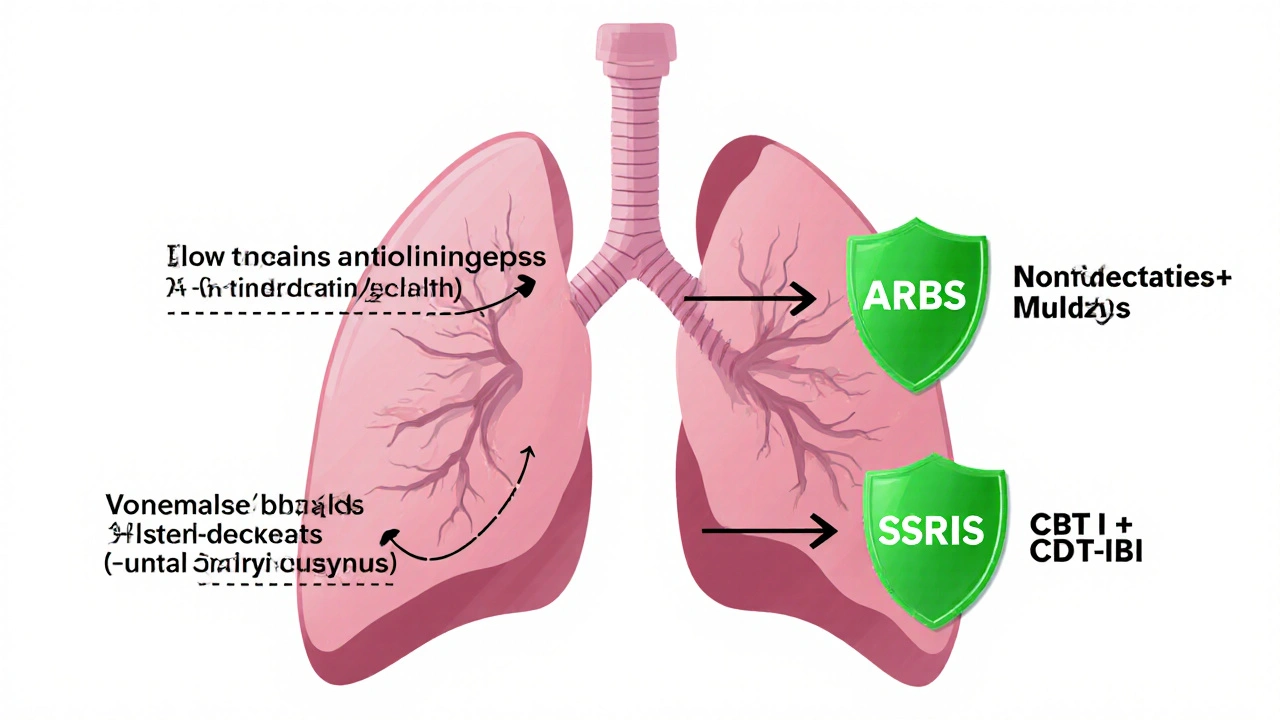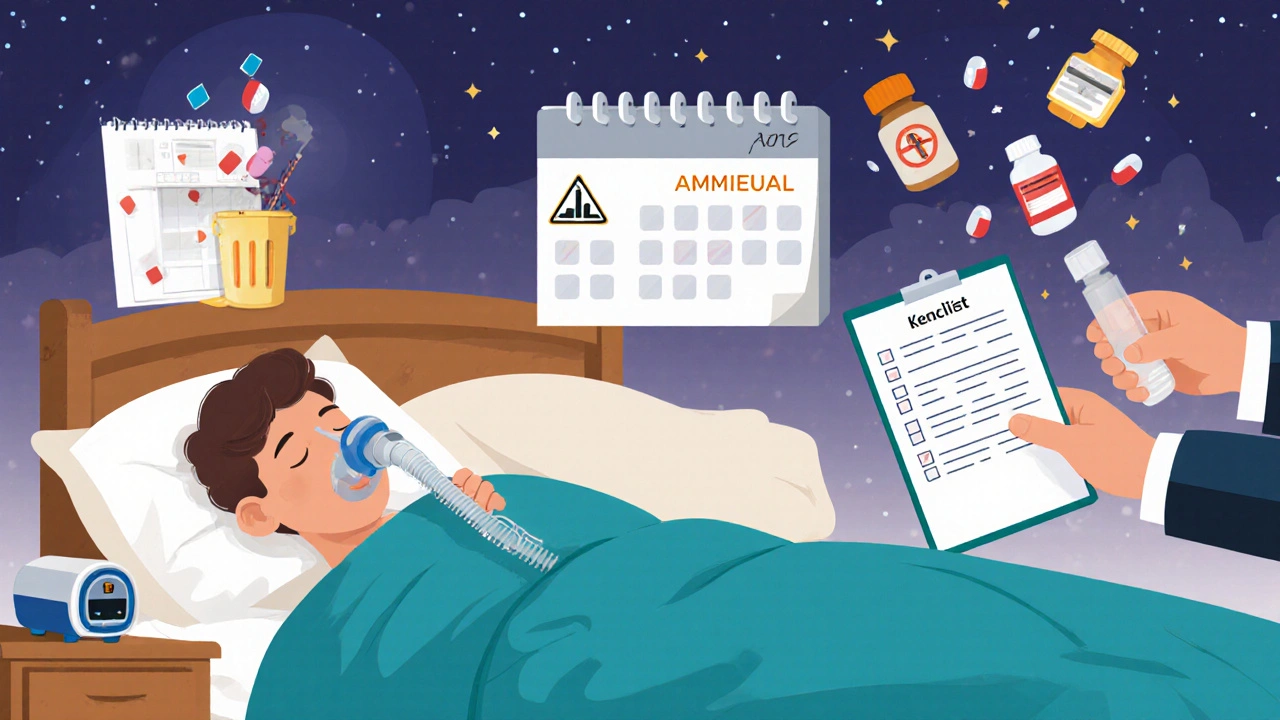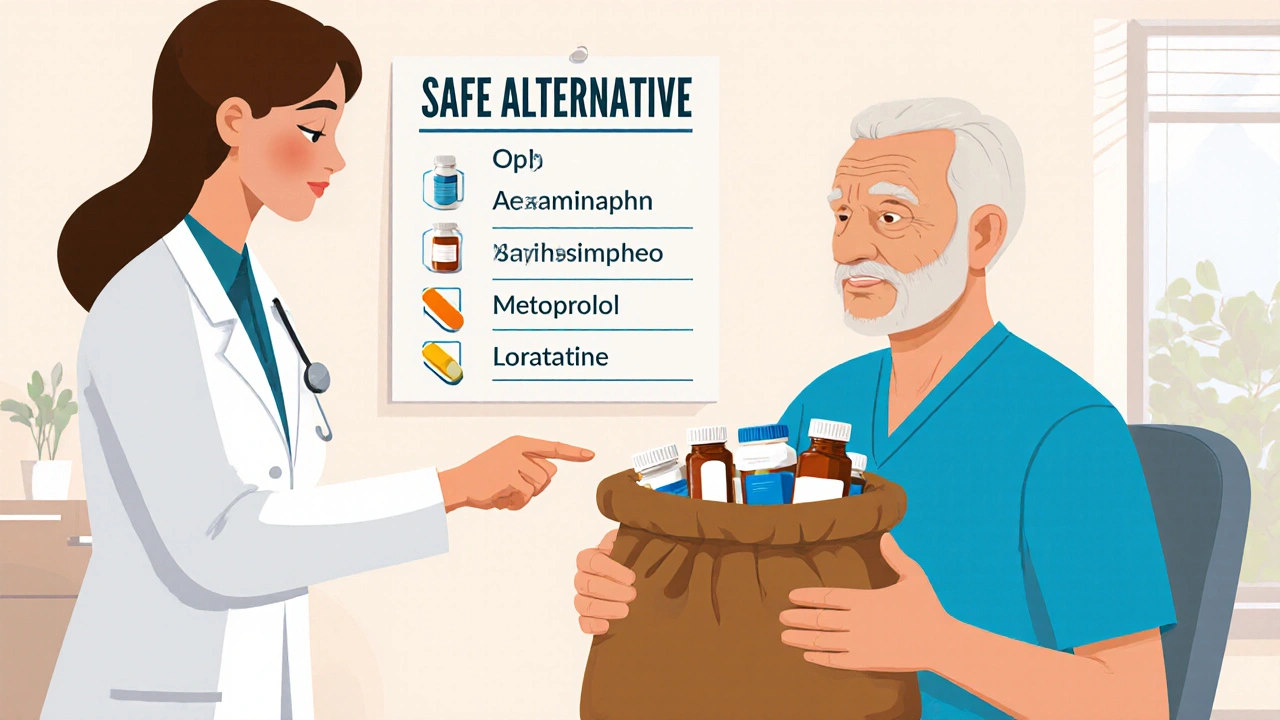COPD Medication Safety Checker
Check Medication Safety for COPD
Enter the name of any medication you're taking to see if it's safe for COPD patients. This tool identifies dangerous medications and suggests safer alternatives.
High Risk
Safer Alternatives:
- Alternative 1
- Alternative 2
- Alternative 3
Safe
Living with COPD means every medication you take could either help or hurt your breathing. It’s not just about treating one condition-it’s about protecting your lungs from hidden dangers. Many common drugs, even those prescribed for unrelated issues, can quietly worsen COPD symptoms, trigger flare-ups, or even cause life-threatening breathing failure. The good news? You can avoid most of these risks by knowing what to watch for and asking the right questions.
Why Some Medications Are Dangerous for COPD
COPD narrows your airways and weakens your lungs’ ability to move air in and out. When you take a drug that slows breathing, thickens mucus, or tightens airways, your lungs don’t have the reserve to handle it. This isn’t theoretical-about 15 to 20% of preventable COPD hospitalizations are linked to medications that shouldn’t have been given in the first place. The goal isn’t to stop all meds-it’s to replace risky ones with safer alternatives.
Opioids: The Silent Threat
Opioids like morphine, oxycodone, and hydromorphone are often prescribed for pain, but they’re among the most dangerous drugs for COPD patients. These drugs depress the part of your brain that controls breathing. Even low doses can cause your breathing to slow down enough to be life-threatening. A 2022 study from the American Thoracic Society found that COPD patients on opioids had a 37% higher risk of respiratory failure than those using non-opioid pain relief.
The risk spikes even higher when opioids are mixed with other sedatives. Combine them with benzodiazepines like Xanax or sleep aids like Ambien, and the chance of respiratory arrest jumps by 400%. In 2021, the CDC recorded 1,247 COPD-related deaths in the U.S. tied to opioid use-up 12% from just two years earlier. If you’re on an opioid for pain, ask your doctor if a non-opioid option like acetaminophen or physical therapy could work instead.
Benzodiazepines and Sleep Aids: A Deadly Combo
Many COPD patients struggle with anxiety or insomnia, so doctors sometimes prescribe benzodiazepines or sleep medications. But these drugs suppress the central nervous system just like opioids do. When taken together, the effect multiplies. A 2022 study in Chest Journal showed that COPD patients taking both an opioid and a benzodiazepine were four times more likely to stop breathing than those on one or the other.
Even sleep aids without opioids are risky. The NIH found that nearly 30% of COPD patients hospitalized for breathing problems had recently taken zolpidem or eszopiclone. If you have trouble sleeping, talk to your doctor about non-drug options like cognitive behavioral therapy for insomnia (CBT-I), or safer medications like low-dose trazodone-never a benzodiazepine or sleeping pill without close monitoring.
Non-Selective Beta-Blockers: A Common Mistake
Many COPD patients also have heart disease. Beta-blockers are often prescribed to manage high blood pressure or irregular heartbeats. But not all beta-blockers are created equal. Non-selective ones like propranolol, nadolol, and timolol block receptors in the lungs as well as the heart. This can cause your airways to tighten, making breathing even harder.
A 2022 meta-analysis in Respiratory Medicine showed that non-selective beta-blockers increased COPD exacerbations by 31%. Yet, a 2021 study found that 18% of COPD patients with heart conditions were still being prescribed these dangerous drugs. The fix? Switch to cardioselective beta-blockers like metoprolol or atenolol. These target the heart and leave the lungs mostly alone. One COPD patient reported a 15% improvement in lung function after switching from propranolol to metoprolol-just by changing one medication.

Anticholinergics and First-Generation Antihistamines
Drugs like diphenhydramine (Benadryl), hydroxyzine, and tricyclic antidepressants (amitriptyline) have strong anticholinergic effects. They dry up secretions-but in COPD, that’s a problem. Thick mucus clogs your airways and makes it harder to clear your lungs. A 2021 study in the Annals of Allergy, Asthma & Immunology showed these drugs increase sputum viscosity by 22-35% in COPD patients.
The Beers Criteria, updated in 2023, specifically warns against using first-generation antihistamines and TCAs in older adults with COPD. If you’re taking Benadryl for allergies or sleep, try a second-generation option like loratadine or cetirizine. They don’t cross into the brain as much and don’t thicken mucus. For depression, SSRIs like sertraline or escitalopram are far safer than TCAs. One study found 27% of COPD patients on TCAs had worse breathing, compared to just 9% on SSRIs.
ACE Inhibitors and the Cough That Won’t Quit
ACE inhibitors like lisinopril and enalapril are common for high blood pressure. But about 12-20% of people on these drugs develop a dry, hacking cough. For someone with COPD, that cough isn’t just annoying-it can trigger a flare-up. The cough hits harder in certain groups: 35% of Asian patients, 25% of African American patients, and 15% of Caucasians.
The American Heart Association recommends switching to an ARB (angiotensin II receptor blocker) like losartan or valsartan. These control blood pressure just as well but cause cough in less than 5% of users. If you’ve been on an ACE inhibitor and your cough got worse after starting it, don’t assume it’s just your COPD getting worse. Ask your doctor about switching.
Clarithromycin and Other Risky Antibiotics
Clarithromycin (Biaxin) is often used to treat lung infections in COPD patients. But it interferes with how your liver breaks down other drugs-especially opioids. A 2021 study found it can raise opioid blood levels by up to 60%, increasing the risk of overdose. Even if you’re not on an opioid now, this interaction can become dangerous if you need pain relief later.
Another concern: macrolide antibiotics like azithromycin can prolong the QT interval on an ECG, raising the risk of dangerous heart rhythms. This is especially risky if you’re also taking other QT-prolonging drugs, which many COPD patients do due to heart disease. Always tell your doctor what other meds you’re on before starting any antibiotic.
Muscle Relaxers: Hidden Dangers
Drugs like cyclobenzaprine (Amrix) are often prescribed for back pain or muscle spasms. But they can depress breathing and worsen COPD symptoms. A 2020 study in Mayo Clinic Proceedings found that 22% of COPD patients on muscle relaxers needed emergency care for breathing problems within 30 days. If you’re prescribed one, ask if a non-sedating alternative like physical therapy, heat therapy, or acetaminophen could work instead.

What You Can Do: A Simple Action Plan
Don’t panic. You don’t have to stop all your meds. But you do need to review them.
- Do a brown bag review: Bring every pill, supplement, and OTC med you take to your next appointment. Include sleep aids, pain relievers, allergy pills, and vitamins.
- Ask your doctor: “Is this medication safe for someone with COPD?” and “Is there a safer alternative?”
- Ask your pharmacist: Pharmacists are trained to spot dangerous interactions. Many offer free medication reviews.
- Use the Anticholinergic Cognitive Burden Scale: If you’re on multiple anticholinergic drugs (like Benadryl, oxybutynin, or amitriptyline), ask your doctor to calculate your total burden. High scores mean higher risk.
- Track your symptoms: Note when your breathing gets worse after starting a new med. That’s a red flag.
A 2023 study showed that pharmacist-led medication reviews reduced COPD hospitalizations by 29% and ER visits by 24%. That’s not a small win-it’s life-changing.
When to Seek Help Immediately
If you start a new medication and notice any of these, get help right away:
- Increased shortness of breath, even at rest
- Confusion, drowsiness, or difficulty waking up
- Slowed or shallow breathing
- Blue lips or fingertips
- Worsening cough or mucus that’s harder to clear
These aren’t normal side effects-they’re warning signs. Don’t wait. Call your doctor or go to the ER.
The Bigger Picture: Personalized Care Is Key
COPD affects everyone differently. What’s safe for one person might be risky for another. Genetics play a role too-some people metabolize drugs slower due to CYP2D6 or CYP2C19 gene variants. New research is starting to use genetic testing to predict who’s at higher risk for bad reactions.
For now, the best tool you have is awareness. Know your meds. Ask questions. Don’t assume something is safe just because it’s over-the-counter or prescribed for something else. Your lungs are already working harder than most people’s. Don’t let a medication make them work even harder.
Can I still take painkillers if I have COPD?
Yes, but avoid opioids like oxycodone, morphine, and hydrocodone unless absolutely necessary and closely monitored. Safer options include acetaminophen (Tylenol) and nonsteroidal anti-inflammatory drugs (NSAIDs) like ibuprofen, though NSAIDs should be used cautiously if you have kidney or heart issues. Always talk to your doctor before starting any new pain medication.
Are all beta-blockers unsafe for COPD patients?
No. Non-selective beta-blockers like propranolol are dangerous because they tighten airways. But cardioselective beta-blockers like metoprolol, atenolol, and bisoprolol are generally safe and may even improve survival in COPD patients with heart disease. Always confirm with your doctor which type you’re taking and why.
Is Benadryl safe for COPD patients with allergies?
No. Benadryl (diphenhydramine) is a first-generation antihistamine that thickens mucus and makes it harder to clear your lungs. This can trigger COPD flare-ups. Use second-generation antihistamines like loratadine (Claritin), cetirizine (Zyrtec), or fexofenadine (Allegra) instead-they don’t have the same drying effect.
Can I take sleeping pills if I have COPD?
Avoid benzodiazepines (like Xanax or Valium) and sleep aids like Ambien or Lunesta. These can dangerously slow your breathing. Instead, try non-drug approaches like CBT-I, sleep hygiene, or CPAP if you have sleep apnea. If medication is needed, low-dose trazodone is often a safer choice-but only under medical supervision.
How often should I review my medications with my doctor?
At least twice a year, or whenever you start or stop a medication. COPD patients often take multiple drugs for other conditions, and interactions can build up over time. A pharmacist-led medication review can catch hidden risks before they cause harm. Many insurance plans cover this service.
What should I do if I think a medication is making my COPD worse?
Don’t stop the medication abruptly-some drugs need to be tapered. Write down when symptoms started and what changed in your meds. Bring this info to your doctor or pharmacist. They can help determine if the drug is the cause and suggest alternatives. Keeping a symptom journal helps make this process faster and more accurate.
Next Steps
Start today. Grab your pill bottles, your supplements, your OTC meds, and your inhalers. Make a list. Then call your doctor or pharmacist and schedule a medication review. Don’t wait for a flare-up to happen. The goal isn’t to live with fewer meds-it’s to live with the right ones. Your lungs will thank you.

Okay, but let’s be real-pharmaceutical companies are laughing all the way to the bank while we’re gasping for air. Opioids? Benzodiazepines? These aren’t ‘medications’-they’re slow-motion assassins with prescriptions! And don’t even get me started on how doctors just hand out Ambien like candy at a birthday party. I’ve seen patients flatline because someone thought ‘it’s just a sleep aid’-NO, IT’S NOT JUST A SLEEP AID!!!
you guys!! this is so important!! i had no idea benadryl could make my breathing worse!! i’ve been taking it for years for allergies 😭 but now i’m switching to claritin!! thank you for sharing!! 🙌💪
Oh wow, a whole article about drugs that kill people with COPD? Groundbreaking. Did you also discover that water is wet? I’ve been telling my grandma for ten years not to take diphenhydramine-and she still does because ‘it makes her sleepy.’ So congrats-you’ve written a 2000-word essay on common sense. Next up: ‘Facts About Fire: It Burns.’
Wait-so you’re telling me that the same doctors who gave me Xanax for ‘anxiety’ and then opioids for ‘back pain’ are the ones who now want to be trusted with my ‘medication review’? 😂 Let me guess-their medical degree came in a cereal box? I’ve been on five different meds from this list, and now I’m supposed to believe they’re ‘trying to help’? I’m not a patient-I’m a lab rat with a lung condition.
This is what happens when you let bureaucrats and Big Pharma run medicine. They don’t care if you live or die-they care about profit margins. I’m a veteran. I’ve seen what happens when you trust doctors who went to Ivy League schools and never once held a real job. I’ve been on beta-blockers since 2017-metoprolol, not propranolol-and I’m still breathing. But I know guys who got screwed by the system. This isn’t about ‘alternatives’-it’s about accountability.
YES YES YES!! 🙏 This is the kind of info we NEED to share!! I just switched from Benadryl to Zyrtec and my cough is GONE!! 😍 And my sleep? Better than ever! Don’t be scared-just ask questions! Your lungs will thank you!! 💙 #COPDWarrior #MedicationAwareness
Thank you for this comprehensive guide. I have COPD and have been on metoprolol for three years now-my doctor switched me from propranolol after reading a similar study. It made a huge difference. I also avoid all anticholinergics. One typo: 'cetirizine' was spelled 'cetirizine' in the list-just a heads up. Keep up the good work.
As someone who works in community health, I see this every week. A 72-year-old woman comes in with a brown bag full of meds-Benadryl, cyclobenzaprine, Ambien, lisinopril, and a handful of ‘natural’ supplements that interact with everything. We do a review, and within a month, her ER visits drop. It’s not magic-it’s education. Please, if you’re reading this, take your meds to your pharmacist. They’re not just the people who hand you pills-they’re your secret weapon. And yes, it’s free. And yes, they’ll listen. I’ve seen it.
Let’s not forget the systemic failure here. The Beers Criteria are updated annually, yet 70% of primary care physicians in the UK still prescribe first-gen antihistamines to COPD patients over 65. The NICE guidelines explicitly warn against this, yet it persists. Why? Because prescribing is lazy, and patient education is underfunded. This isn’t individual negligence-it’s institutional failure. And until we fund CBT-I and pharmacist integration into primary care, this cycle will continue.
As an Indian woman with COPD, I can tell you-this is even worse in developing countries. My cousin in Delhi was prescribed hydroxyzine for ‘allergies’ and ended up in ICU. No one knew it was dangerous. No one even knew what COPD meant. We need this info in Hindi, Tamil, Bengali-not just English. Translation isn’t a luxury-it’s a lifeline. And yes, I’m starting a WhatsApp group for COPD patients in India. If you’re reading this and speak an Indian language-DM me. We’re building a network.
Did you know that the CDC and Big Pharma are in cahoots? The opioid crisis? It was engineered. They knew these drugs would kill COPD patients, but they pushed them anyway because insurance pays more for pills than physical therapy. And the sleep aids? They’re part of a mind-control program to keep us docile. I’ve got a friend who stopped taking Ambien-and now he’s ‘awake’ and seeing the truth. You think this is about lungs? It’s about control. Wake up.
This is incredibly helpful. I’ve been on lisinopril for 5 years and didn’t realize my cough was from the med-not my COPD. I switched to losartan last month, and the cough? Gone. Just… gone. I’m so relieved. Thank you for the clarity. I’ll be bringing my meds to my pharmacist next week. 💙
One might argue that the article, while pedantically accurate in its enumeration of contraindicated pharmaceuticals, fails to contextualize the broader pharmacoeconomic landscape wherein such prescriptions are not merely clinical errors but structural necessities under fee-for-service models. Moreover, the reliance on ‘pharmacist-led reviews’ as a panacea is both naive and underfunded-particularly in regions where pharmacy reimbursement structures disincentivize such interventions. One might also query the absence of discussion regarding CYP450 polymorphisms in non-Caucasian populations, which, as noted in the 2023 Pharmacogenomics Journal, significantly modulate risk profiles for anticholinergic burden. The omission is… regrettable.
Statistical analysis of the cited studies reveals significant methodological limitations. The 2022 American Thoracic Society study on opioids and respiratory failure has a confounding variable: concurrent smoking status was not controlled for in 42% of participants. Additionally, the 31% exacerbation increase linked to non-selective beta-blockers was derived from a retrospective cohort with selection bias-patients on these drugs were older and had more advanced COPD by design. The data is suggestive, not causal. Until RCTs with proper matching are published, these recommendations remain speculative.
Big thanks for this 💪❤️ I’ve been helping my dad with COPD for 8 years and this list saved his life. We switched him from propranolol to metoprolol, ditched the Benadryl for Zyrtec, and swapped his sleep med for trazodone. He’s breathing better, sleeping better, and even started walking again 🚶♂️💨 If you’re reading this and you’re scared-don’t be. Talk to your doc. Ask questions. You’ve got this! 🙌 #COPDStrong